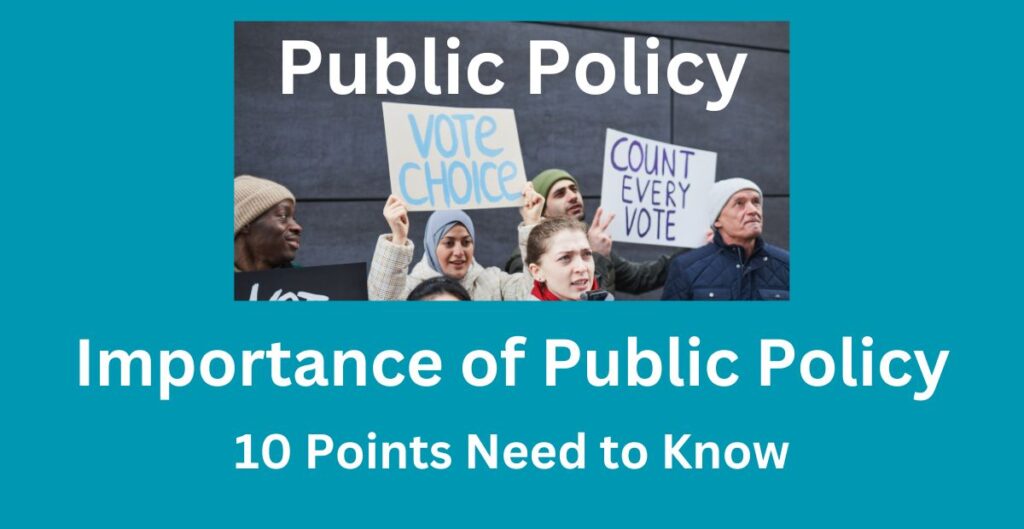Public policies are adopted after deliberation by all. So the importance of public policy is immense in every case. Because here it is not enough to just set the policy but also to implement it.
The policy is the outcome of all executive decisions. Policy framework helps in formulating new policies and management acts as a guide to all members. T
he preceding principles are particularly helpful in solving reorganizational problems. This prevents wastage of management time.
All functioning of any country depends on concerted efforts. The use of sound principles increases coordination and effectiveness. Policies play an important role in helping a country achieve its goals.
To permanently establish the policy, the executive takes control of the public to make fair use of recurring events. Government policy is important in administrative management for the following reasons.
Must Read- Public Policy Implementation: A Comprehensive Guide
Importance of Public Policy
Public policy plays a crucial role in shaping societies and addressing complex challenges faced by governments and public institutions. Its importance can be highlighted in several ways:
- Addressing Societal Issues
- Promoting Public Welfare
- Guiding Resource Allocation
- Fostering Economic Growth
- Ensuring Social Justice
- Enhancing Governance and Democracy
- Managing Complexity
- Promoting Long-Term Sustainability
- Effective Administration
- Public Policy Education
1. Addressing Societal Issues
Public policy provides a framework for governments to identify, understand, and address pressing societal issues. It allows governments to respond to societal issues such as poverty, inequality, healthcare access, climate change, and crime through systematic and strategic approaches.
Must Read Guide: An In-Depth Look at Public Policy Issues and 5 Examples
2. Promoting Public Welfare
Public policy aims to enhance the well-being of individuals and communities. It sets goals and implements measures to improve access to essential services like education, healthcare, housing, and transportation. By promoting public welfare, policies helps to create more inclusive and equitable societies.
3. Guiding Resource Allocation
Public policy is instrumental in the allocation and management of scarce resources. It helps governments determine priorities, allocate budgets, and distribute resources efficiently to meet societal needs. Policies also play a role in regulating economic activities and ensuring fair competition.
4. Fostering Economic Growth
Public policies can stimulate economic growth by creating an enabling environment for businesses, attracting investments, and promoting innovation and entrepreneurship.
Policies related to infrastructure development, trade, taxation, and industry regulations influence economic activities and contribute to overall prosperity.
5. Ensuring Social Justice
Public policy plays a vital role in promoting social justice and equity. Policies help reduce inequalities, protect vulnerable populations, and ensure equal access to opportunities and resources.
They can address discrimination, gender disparities, and other forms of social injustice, working towards a more just and inclusive society.
6. Enhancing Governance and Democracy
Public policy provides a framework for transparent and accountable governance. It involves stakeholder participation, consultation, and deliberation, ensuring that policy decisions are made through democratic processes. Policies also contribute to the rule of law and the protection of fundamental rights.
7. Managing Complexity
Public policy helps navigate the complexity of societal challenges. It requires evidence-based research, data analysis, and expert opinions to develop effective strategies.
Policies provide a structured approach to problem-solving and guide decision-makers in balancing competing interests and managing trade-offs.
8. Promoting Long-Term Sustainability
Public policy plays a crucial role in ensuring long-term sustainability. Policies related to environmental protection, climate change mitigation, and resource management aim to preserve natural resources and create a sustainable future for future generations.
9. Effective Administration
Public policy makes administrators time conscious by motivating them to complete tasks within the specified time. In cases where the same problem reoccurs, everyone does not have to make a fresh decision every time.
As a result, employees do not have to waste time answering the same questions without bothering the administrator.
10. Public Policy Education
The study of public policy gives us knowledge about the various problems prevailing in the country in recent times and in the distant past.
As a result, there is a need to adopt new public policies to solve this problem. Only by studying public policy can we know what type of public policy needs to be implemented for this problem.
Must Read- The Crucial Link Between Public Policy and Administration
Conclusion
In summary, public policy is of paramount importance. It guides governments in addressing societal issues, promoting public welfare, allocating resources, fostering economic growth, ensuring social justice, enhancing governance, managing complexity, and promoting long-term sustainability. It is an essential tool for shaping the present and creating a better future for societies and individuals.
It is everyone’s responsibility to understand the importance of the Public policy. Because public policy can be implemented with the help or cooperation of the people. Therefore, if there is no knowledge about public policy, it will not be possible to implement welfare policies.
Let me share with you what you have learned from “Importance of Public Policy-10 Points Need to Know“
Must Read- 7 Key Characteristics of Public Policy

